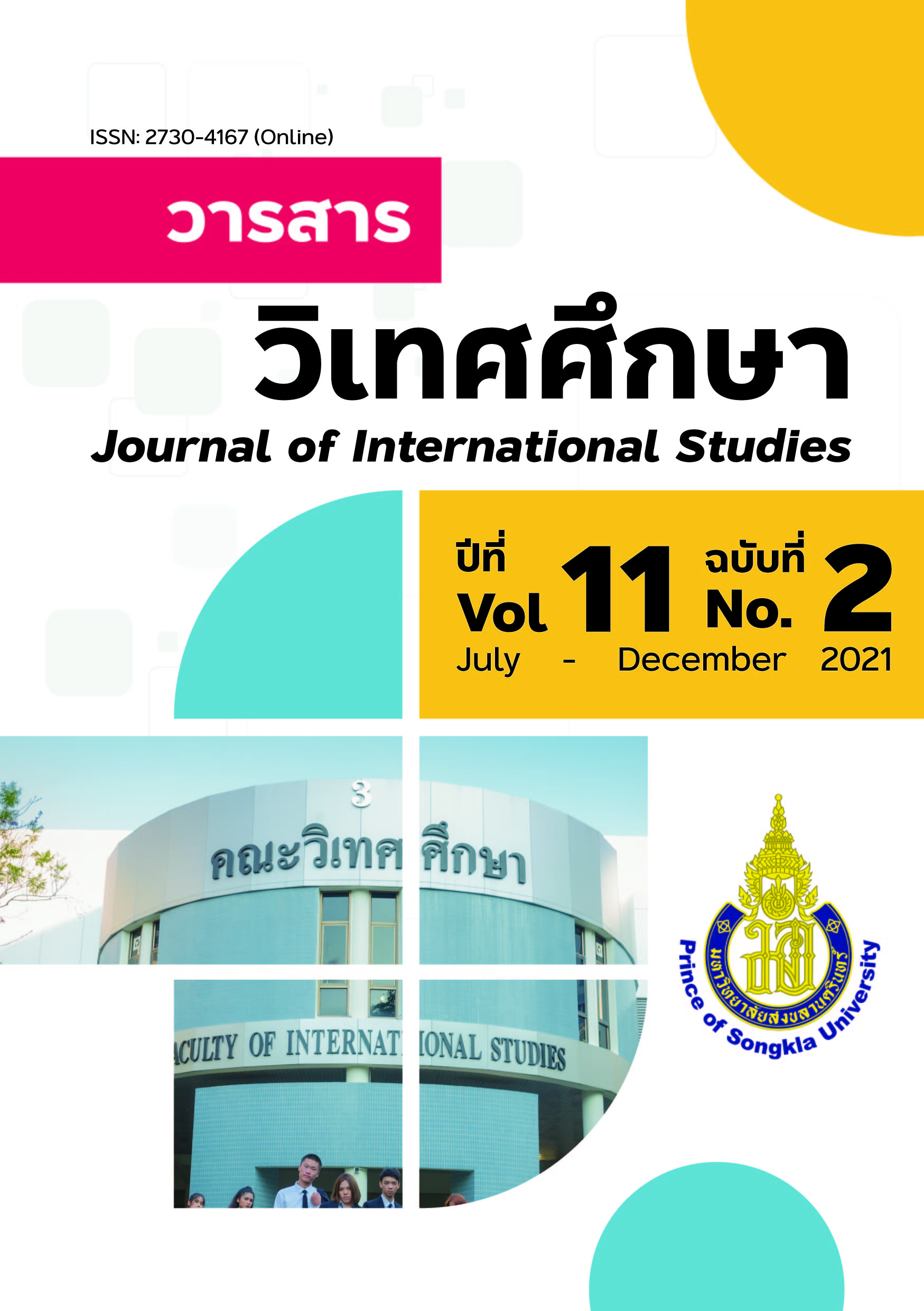The Decision for Shadow Education Participation and the Perceived Formation of Educational Inequality in Thailand
Main Article Content
Abstract
This study deals with the shadow education system of private tutoring in Thailand, aiming to highlight the perceptions of students from different social backgrounds for the decisionmaking of shadow education. While a number of studies have examined the economic and policy implications of shadow education, few have undertaken thorough research of the sociological factors in Thailand. This study is primarily concerned with the relationship between social origin and discrepancy of educational opportunities of shadow education particularly to the students involved. The research was conducted through semistructured interviews and focus groups as a foundation for its qualitative research. Students from grade 10 to 12 were purposefully chosen for the data collection. The findings indicated that the decision is strongly influenced by social origin and economic, social, and cultural status (ESCS) which exert a particularly high influence on the likelihood to choose shadow education particularly to those with more financial resources. The research contributes to the awareness of shadow education that benefits students’ learning while also bringing disadvantages showing implications of private tutoring which relates to students’ family socio-economic situations.
Article Details
Statements and opinions expressed in articles herein are those of the authors and do not necessarily reflect the position of the editors or publisher.
Article, information, text, image, etc. which are published in Journal of International Studies, belong to Journal of International Studies. If anybody or any organization would like to use part or whole of them, they must receive written permission from Journal of International Studies before usage.
References
Boudon, R. (1974). Education, Opportunity, and Social Inequality. John Wiley and Sons, New York.
Bray, M. (1999). The Shadow Education System: Private Tutoring and Its Implications for Planners. Paris: UNESCO, International Institute for Educational Planning.
Bray, M. & Chad, L. (2012). Shadow education: Private supplementary tutoring and its implications for policymakers in Asia. Asian Development Bank and Hong Kong/Comparative Education Research Centre, The University of Hong Kong.
Bray, M. & Zhan, S. & Lykins, C. & Wang, D. & Kwo, O. (2013). The effectiveness of private tutoring: students’ perceptions in comparison with mainstream schooling in Hong Kong. Asia Pacific Education Review, v. 14 n. 4, p. 495-509.
Bray, M. & Zhan, S. & Lykins, C. & Wang, D. & Kwo, O. (2014). Differentiated demand for private supplementary tutoring: Patterns and implications in Hong Kong secondary education. Economics of Education Review, 38 (1), 24–37.
Breen, R. & Golthorpe, H. J. (1997). Explaining Educational Differentials: Towards a Dormal Rational Action Theory. Rationality and Society 9: 275–305.
Charoenkul, N. (2018). Shadow Education in Thailand: Thai and International Perspective. Education in the Asia-Pacific Region: Issues, Concerns and Prospects 42.
García, E. & Weiss, E. (2017). Education inequalities at the school starting gate. Retrieved Dec, 2, 2020, from https://www.epi.org/publication/education-inequalities-at-the-school-starting-gate/.
Hallinger, P. (2012). Synthesis of Findings from 15 Years of Educational Reform in Thailand: Lessons on Leading Educational Change in East Asia. INVALSI Conference, Rome Italy.
Hays, J. (2014). Education in Thailand: History, Literacy, Women, Universities Problems, Improvement. Retrieved, Dec, 2, 2020, from http://factsanddetails.com/southeast-asia/Thailand/sub5_8g/entry-3297.html.
Khomsan, P. (2017). Shadow in Action: When School Tutorage Sustains the Thai Education System. Thammasat University. (in Thai)
Lao, R. (2014). Analyzing the Thai state policy on private tutoring: the prevalence of the market discourse. Asia Pacific Journal of Education, 34(4), 476-491.
Iakovos, T. (2018). Shadow Education and Social Class Inequalities in Secondary Education in Greece: The Case of Teaching English as a Foreign Language, International Journal of Sociology of Education, 7(1), 71-93.
Thomsen, P., Munk, M., Misja, E., & Hansen G. (2013). The educational strategies of Danish university students from professional and working-class backgrounds. Comparative Education Review, 57(3), 457–480.
Kai, M., et al. (2010). Transitions in the education system: Theoretical concepts and their application in empirical research during the transition to secondary school. Journal of Educational Science 9 (3): 299–327.
Office of the Private Education Commission. (2019). Statistics of Private Education. Retrieved June, 26, 2020, from https://opec.go.th.
Padkuntod, P. (2017). Thai education system fails to pass the test. Retrieved May, 11, 2020, from https:// www.bangkokpost.com/opinion/opinion/1363115/thai-education-system-fails-to-pass-the-test-say.
Rolf, B. & Wolfgang, L. (2010). ‘Education as a privilege — causes, mechanisms and effects’: Explanations and findings on the causes of educational inequality. Wiesbaden, Germany: VS Verlag: 11–49.
Sangnapaboworn, W. (2018). The Evolution of Education Reform in Thailand: An Old Elephant in Search of a New Mahout. Education in the Asia-Pacific Region: Issues, Concerns and Prospects, vol 42. Springer, Singapore.
Stevenson, D. L., & Baker, D. (1992). Shadow Education and Allocation in Formal Schooling: Transition to University in Japan. American Journal of Sociology 97(6): 1639–57.
Steve, R. E. (2018). Shadow Education and Social Inequalities in Japan: evolving Patterns and Conceptual Implications. Springer International Publishing AG.
Southgate, D. (2009). Determinants of Shadow Education: A Cross-National Analysis. Doctoral dissertation, Columbus: The Ohio State University.
Thompson, R. (2016). Explaining inequality? Rational action theories of educational decision making. In: Access to Higher Education: Theoretical Perspectives and Contemporary Challenges. Research into Higher Education. Routledge, London, UK.
Tribune. (2012). Shadow education: Private tutoring is more commercial than schooling, Retrieved June, 26, 2020, from https://tribune.com.pk/story/403717/ shadow-education-private-tutoring-is-more-commercial-than-schooling/.
Ye, L. (2018). Choices, risks and rational conformity: extending Boudon’s positional theory to understand higher education choices in contemporary China. High Educ 77, 525–540.
Yung, K. W. H., & Bray, M. (2017). Shadow education: Features, expansion and implications. In T. K. C. Tse & M. Lee (Eds.), Making sense of education in post-handover Hong Kong: Achievements and challenges (pp. 95-111). London: Routledge.
Kim, Y. & Jung, J. (2019). Shadow Education as Worldwide Curriculum Studies. Springer International Publishing.
Tuptimsuwan, W. (2015). Factors Affecting EFL High School Students’ Decisions in Learning English at Tutoring Institutions. Thammasat University.
Xue, H. & Ding, X. (2009). A Study on Chinese Urban Student Supplementary Tutoring. Education Research, No.1, 39-46.


